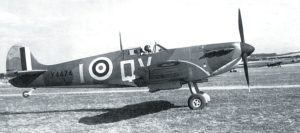Good morning, Whitewater.
Sunday in town will be sunny with a high of eighty-four. Sunrise is 5:27 AM and sunset 8:33 PM, for 15h 06m 40s of daytime. The moon is a waxing crescent with 35.6% of its visible disk illuminated.
Friday’s FW poll asked what readers thought of a kale-eating contest, substituting kale for a more conventional contest food. Most respondents, 68.19%, voted yes to a contest with kale.
7.10.1940 sees the beginning of the Battle of Britain:
X4474, a late production Mk I Spitfire of 19 Squadron, September 1940. During the battle 19 Squadron was part of the Duxford Wing The Battle of Britain (German: die Luftschlacht um England, literally “Air battle for England”) was a combat of the Second World War, when the Royal Air Force (“RAF”) defended the United Kingdom (“UK”) against the German Air Force (Luftwaffe) attacks from the end of June 1940, and described as the first major campaign fought entirely by air forces.[14] The British officially recognise its duration as from 10 July until 31 October 1940 that overlaps with the period of large-scale night attacks known as the Blitz,[15] while German historians do not accept this subdivision and regard it as a campaign lasting from July 1940 to June 1941.[16]
….By preventing the Luftwaffe’s air superiority over UK, the British forced Adolf Hitler to postpone and eventually cancel Operation Sea Lion, a provisionally proposed amphibious and airborne invasion of Britain. However, Nazi Germany continued bombing operations on Britain, known as the Blitz. The failure to destroy Britain’s air defencesto force an armistice (or even surrender outright) is considered by Steven Bungay to be the Nazi’s first major defeat in World War II, and a crucial turning point in the conflict.[19]
On this day in 1832, Gen. Atkinson’s soldiers begin building a fort:
1832 – Fort Koshkonong Construction Begins
On this date General Henry Atkinson and his troops built Fort Koshkonong after being forced backwards from the bog area of the “trembling lands” in their pursuit of Black Hawk. The Fort, later known as Fort Atkinson, was described by Atkinson as “a stockade work flanked by four block houses for the security of our supplies and the accommodation of the sick.” It was also on this date that Atkinson discharged a large number of Volunteers from his army in order to decrease stress on a dwindling food supply and to make his force less cumbersome. One of the dismissed volunteers was future president, Abraham Lincoln, whose horse was stolen in Cold Spring, Wisconsin, and was forced to return to New Salem, Illinois by foot and canoe. [Sources: History Just Ahead: A Guide to Wisconsin’s Historical Markers edited by Sarah Davis McBride and Along the Black Hawk Trail by Willilam F. Stark]

